
At least five interesting things: Bananas republic edition (#60)
Trump's chaos; GDP and government spending; DOGE; AI and growth; The baby bust
It’s been a while since I’ve done one of these roundups, since I’ve been busy writing about the chaos unleashed by the Trump administration. It’s hard to think about the latest cool economics paper when your country is in the midst of rapidly destroying much of what made it great over the last century. We’re becoming not so much of a banana republic as a bananas republic.
Anyway, don’t be surprised that Trumpian chaos occupies 3 out of this week’s 5 items. But in the meantime, here are some podcasts. I went on the How To Money podcast, and talked about how Trump’s economic policies could affect people’s personal finances:
I also have two episodes of Econ 102, mostly about Trump stuff:
Anyway, on to the list!
1. Americans aren’t enjoying the Trump chaos
I’ve consistently used the term “chaos” to describe what Trump is doing in his second term, and it looks as if Americans are slowly starting to realize that chaos is what they’re getting:
Nate Silver now has an aggregator measuring Trump’s approval rating across a variety of polls, and it has crept steadily downward:
A variety of polls also show a slow souring of sentiment. Here’s CNN:
Most adults nationwide, 55%, say that Trump has not paid enough attention to the country’s most important problems and 62% feel he has not gone far enough in trying to reduce the price of everyday goods. Sizable shares across party lines share the latter view, including 47% of Republicans, 65% of independents and 73% of Democrats. In CNN’s January polling, the economy eclipsed all other issues as Americans’ top concern…
More describe themselves as pessimistic or afraid when looking ahead to the rest of Trump’s second term (54%) than say they feel enthusiastic or optimistic about it (46%). In December, 52% were on the positive side, 48% negative. Notably, the share saying they feel “afraid” has climbed 6 points to 35%, rising by a roughly equal share across partisan lines.
The Washington Post gets similar results:
Overall, 43 percent of Americans say they support what the president has done during his first month in office, with 48 percent saying they oppose…[M]ost Americans agree with the view that he has exceeded his authority…
On specific areas of responsibility, a majority disapprove of how he is handling the economy (53 percent vs. 45 percent approving), and a similar majority disapprove of how he is managing the federal government (54 percent). On immigration, opinions are closely divided, with 50 percent approving of how he’s handling the issue and 48 percent disapproving…
Americans disapprove by a 2-to-1 margin of [Elon] Musk shutting down federal agencies that he decides are unnecessary, and most (63 percent) are concerned that his team is gaining access to sensitive personal data of individuals.
Meanwhile, betting markets have soured on the idea that Trump and Elon will produce any meaningful cuts in spending:
I’m actually a little bit disappointed in how long it’s taking Americans to realize that they’ve purchased a lemon. But as Trump continues to roll out new chaos every day — more tariffs, missed Social Security payments, cancellation of the industrial policies that were driving America’s factory construction boom, tolerance of money laundering, cuts in defense production, cutoffs of food aid and emergency aid around the world, more attacks on science funding, and so on — I expect opinion to continue to sour. Even in the middle of our post-2010s exhaustion, you just can’t do this much chaos without people noticing.
2. Should GDP include government spending?
Elon Musk recently declared that GDP shouldn’t include government spending:
It’s an interesting claim. Brian Albrecht has a good post rebutting it:
Brian’s post is great, but I think Elon’s argument deserves a little more attention. GDP is supposed to measure the value of all the things that a country produces. But what does “value” mean? Traditionally, in economics, it means “market value” — if someone pays $10 for a sandwich, then it was a sandwich that was worth $10 to that person, so $10 was created by making that sandwich. If a company buys a machine for $10 million, we generally assume it had a good reason to do so — in other words, we assume that the machine is capable of producing at least $10 million worth of stuff in the future, or the company wouldn’t have bought it.
But the government is different. When the Russian government buys $10 billion worth of tanks and sends them all to get blown up in Ukraine, is that creating value for anyone? It’s a philosophical question — you could argue that literally anything Vladimir Putin does has value to him ex ante — but I’d say no, that’s not creating any value.
The problem here is that we value government purchases at cost — we assume that the government is just like any individual consumer, and that how much the government spends on a thing is a measure of how much the people who run the government want that thing. But the government is not actually a person; it’s the reflection of the will of some people, but only in an approximate way.
And yet to omit government purchases1 from GDP would be to ignore some real value creation. If the government builds a highway, that highway probably has value. If it funds research, that research generally has value. And so on. The military often has value too. And as much as you might hate the DMV, abolishing it would probably make driving a worse experience in America — so it creates some value too. If you had a country where the government produced everything, that wouldn’t be the world’s most efficient economy, but it makes no sense to say that that economy produces zero value.
So while including government purchases in GDP is fraught with assumptions, to omit it would be to ignore real value creation — and that’s probably worse. Also, as a pragmatic matter, omitting government purchases from GDP won’t change the economic growth numbers very much:
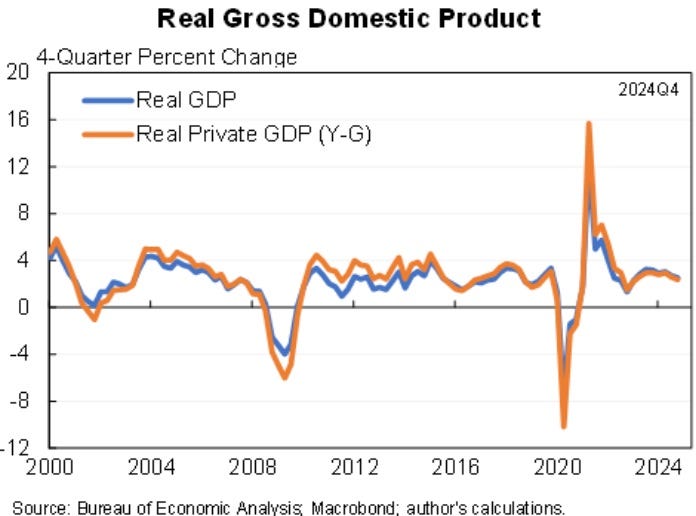
And as Albrecht shows in his post, the Biden years look even better economically if you omit government from the equation.
So it’s not reasonable to argue that growth in government spending is papering over declines in real economic activity. It’s not.
Anyway, yes, adding government purchases into GDP probably does distort it a bit from the “true” perfect value of GDP that we’d like to measure. But that doesn’t stop GDP from being correlated with all kinds of measures of human well-being, and it doesn’t stop GDP growth from being correlated with employment. And those are really the things we actually care about.
3. Read Santi Ruiz on DOGE
I’ve always argued that DOGE is, first and foremost, an ideological purge rather than an actual push for government efficiency. The point is to purge wokeness from the civil service, and then use a reconstituted civil service to purge wokeness from other institutions. JD Vance pretty much summed it up recently:
The disappointment among people who actually care about government efficiency is palpable. Santi Ruiz — almost certainly the best writer on the topic — has a lot to say in an excellent recent post:
This is the single best thing I’ve read on DOGE so far. Ruiz tries to be fair-minded and generous, refusing to blame DOGE for actions taken by other parts of the Trump administration, giving DOGE the benefit of the doubt whenever possible, arguing that many of these civil service cuts would have happened without DOGE anyway, and acknowledging when DOGE has done some good. But his overwhelming tone is one of disappointment and frustration.
On DOGE’s firings, Ruiz is extremely pessimistic:
So far, DOGE has focused only on the firing part, and not at all on the hiring part…It’s a missed opportunity to fix the talent pipelines that plague federal hiring. And…the people DOGE is firing are disproportionately the more talented and more useful people…
In many cases, the probationary employees are exactly who I would not like DOGE to fire, from an efficiency standpoint: they’re the younger, less entrenched, more technologically savvy people…The administration is also shuttering the Presidential Management Fellowship, a small program that made it easier to hire new graduates outside of the usual clunky federal hiring process…
DOGE has been extremely sloppy about cutting contracts and reporting the numbers. Most of the biggest ticket savings have been the result of DOGE misreading federal contracting data, or killing contracts that were already dead…What’s more concerning than the sloppiness itself is that it does not appear to be getting resolved over time…DOGE has instituted few if any ground-up mechanisms within the federal government to surface real savings opportunities…
DOGE is using the right-leaning definition of “state capacity.” But if you want Singapore-style effectiveness, you need to do some things that historically coded left, like paying civil servants more and giving them more freedom.
Ruiz calls DOGE’s destruction of USAID “egregious”:
USAID is a very frustrating story, and, for me personally, it’s the DOGE move that’s truly egregious, as opposed to uncomfortable, foolish, or poorly executed…There are good things USAID funds, and wasteful things it funds, and good governance means being able to distinguish between the two…
[W]e’ve covered the failings of USAID in depth: for instance, our conversation with Kyle Newkirk, who ran procurement for USAID in Afghanistan…I cataloged a few examples in this thread in March 2024. In many cases, oversight bodies all but directly accuse USAID of lying…
USAID may end up being folded into the State Department…I think it’s quite plausible that this leads to a better, leaner, more politically accountable USAID in the long run. But in the meantime, real lifesaving aid has been halted and the systems that administer it have been broken.
But he does credit DOGE with doing some good things:
Some things that DOGE is doing that I like [include]…Bringing real technical talent in…Modernizing and integrating IRS data systems…Improving the tech stack across the whole of the federal government…The general culling of handouts via contract to politically aligned NGOs…The biggest federal contractors (or “Beltway bandits”) are malign actors that benefit from wasteful contracting practices, and they are very worried about losing access.
Ruiz concludes that “it still feels too early to pass judgment on whether DOGE is or will be a net positive or negative.” But overall there’s a bone-deep frustration with the fact that Elon and Trump prioritized rooting out ideological enemies over making government function well.
4. Tyler Cowen on AI progress
Tyler recently managed to articulate something that had been rattling around in my mind about AI and economic growth over the past two years:
Due to the Baumol-Bowen cost disease, less productive sectors tend to become a larger share of the economy over time…And the more efficient AI becomes, the more this trend is likely to continue, which slows the prospective measured growth gains from AI…Human bottlenecks become more important, the more productive is AI…These do not have to be regulatory obstacles, though many are. It may be slow adopters, people in the workplace who hate AI, energy constraints, and much more…The O-Ring model makes AI hard to work with. The O-Ring model stipulates that, in some settings, it is the worst performer who sets the overall level of productivity…Soon enough, at least in the settings where AI is supposed to shine, the worst performer will be the humans.
There are many other good points in the post, so check it out.
Basically, this is the idea that many of the things humans do are complements to AI, rather than substitutes — AI will not simply be an autonomous god that does everything, but a technology that people use. The “O-Ring model” is a reference to a famous 1993 paper by the economist Michael Kremer, who would go on to win the Nobel. It’s basically the idea that if there are even a couple things AI can’t do, then the growth boost from AI could be a lot lower than the optimists expect.
If so, what does that say about humans’ wages? Usually, when two things are complementary, we expect their price to rise in tandem — when the price of left shoes goes up, the price of right shoes goes up accordingly, because you need both kinds of shoes in equal numbers. So a simple Econ 101 model of AI-human complementarity would predict that AI will raise human wages.
But the O-Ring theory makes a more pessimistic prediction. In the O-Ring theory, all the smart workers cluster together in a few superstar companies and a few rich developed countries. If AI is like that — if you have a few superstar companies and a few rich countries using it to their advantage, while everyone else languishes — then the result of AI could be low long-term growth coupled with massive inequality. So hopefully this isn’t a good theory of AI-human production.
5. People on the left are starting to realize that low birth rates are a problem
I’ve been talking about the economic dangers of low fertility rates for a while now:
This is a very frustrating discussion, because progressives tend to see concerns about low fertility as either A) demands that women give up their careers and get back in the bedroom and pump out some kiddos, and/or B) a call for white people to breed so we don’t have to import those scary brown immigrants.
While I’m sure some rightists out there are thinking both (A) and (B), I’m definitely not thinking either of those things. There are plenty of reasons to want higher fertility that have nothing to do with enforcing traditional gender roles or changing America’s racial demographics. Low fertility is bad for the economy because aging slows down productivity growth. It creates a huge burden on young people (more often women) who have to do eldercare as the population of retirees rises. And the whole world is experiencing falling fertility, including poor countries in Africa, South Asia, and Latin America who don’t have the money to comfortably take care of a vast number of retirees.
But realistically, people don’t tend to listen to economic concerns like that. So maybe the only way to get progressives to worry about the baby bust is to get them to realize that they’re being outbred by the conservatives. Kristen Brown does a valiant job of making this argument:
Over the past three decades, Republicans have generally given birth to more kids than Democrats have. But during those first years of the first Trump administration, the partisan birth gap widened by 17 percent…According to experts I spoke with, as the ideological distance between Democrats and Republicans has grown, so has the influence of politics on fertility. In Trump’s second term, America may be staring down another Democratic baby bust…
In the U.S., partisan differences in fertility patterns have existed since the mid-1990s. Today, in counties that lean Republican, people tend to have bigger families and lower rates of childlessness; in places that skew Democratic, families tend to be smaller. And according to an analysis by the Institute for Family Studies, a right-leaning research group, places that tilt more Republican have become associated with even higher fertility rates over the past 12 years.
This isn’t near the top of the list of my own personal concerns about low fertility, but maybe it’ll be able to convince progressives that pro-natalism isn’t some sort of secret rightist plot.
Note that transfer payments — when the government simply mails people checks — are already not counted in GDP.





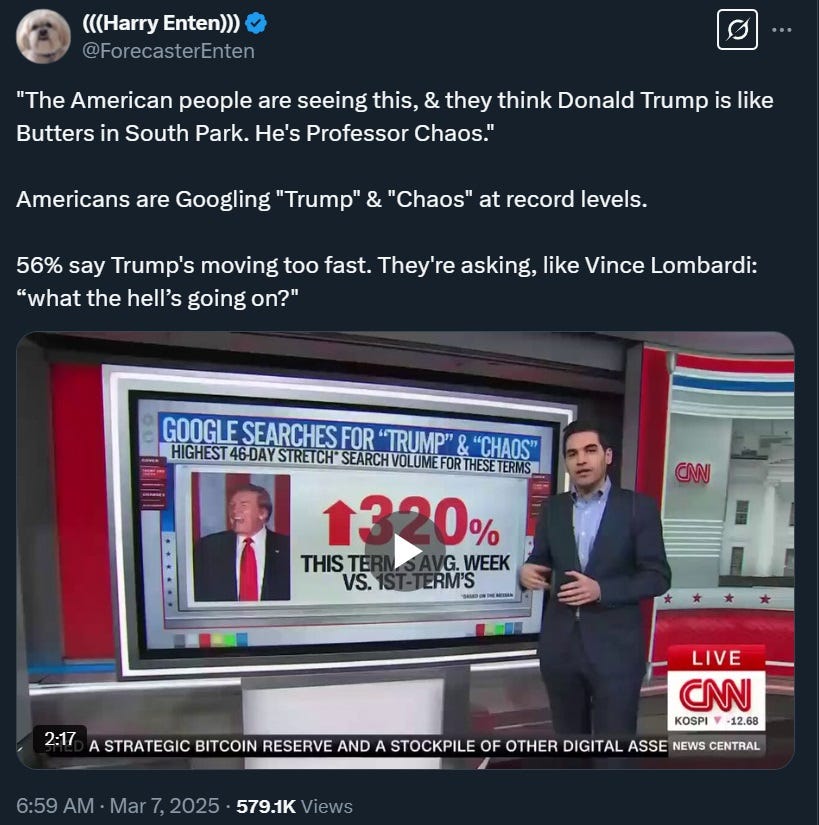
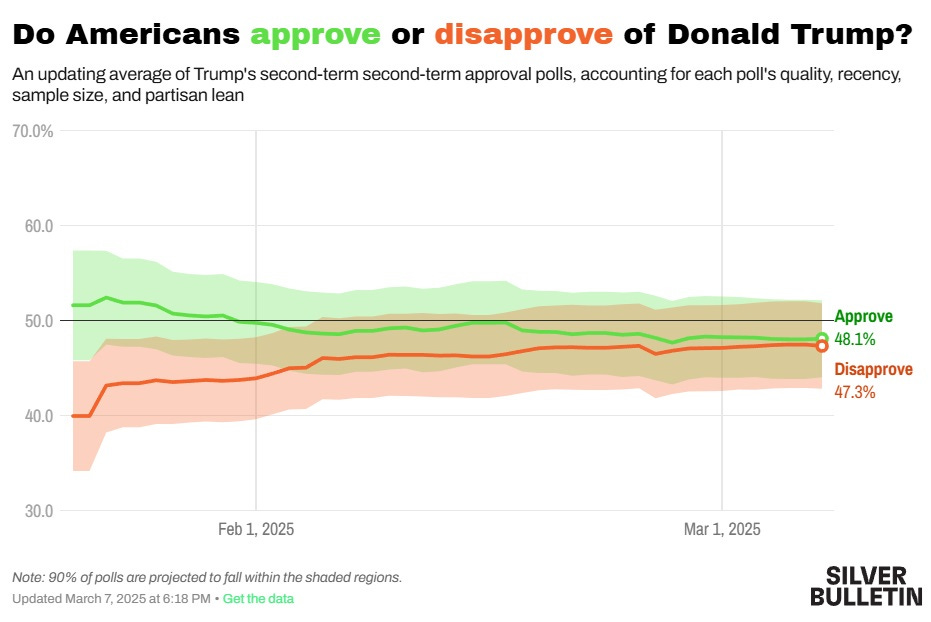
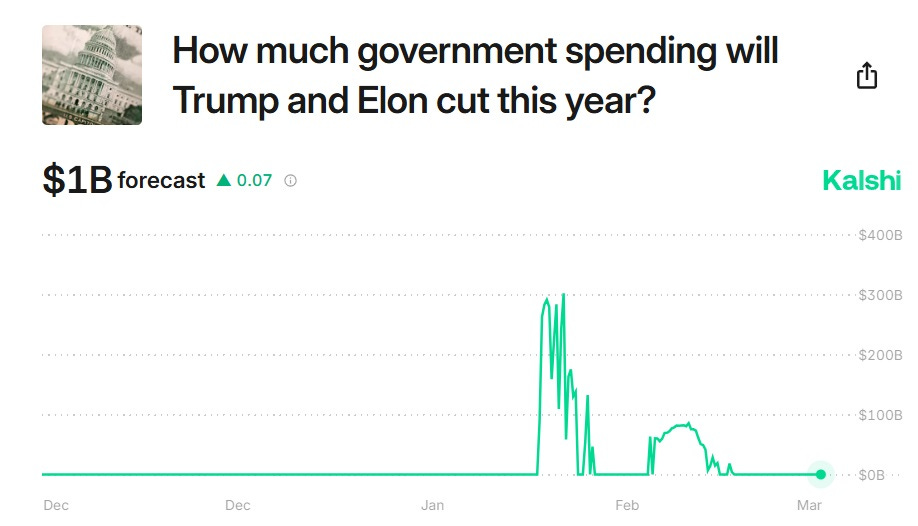
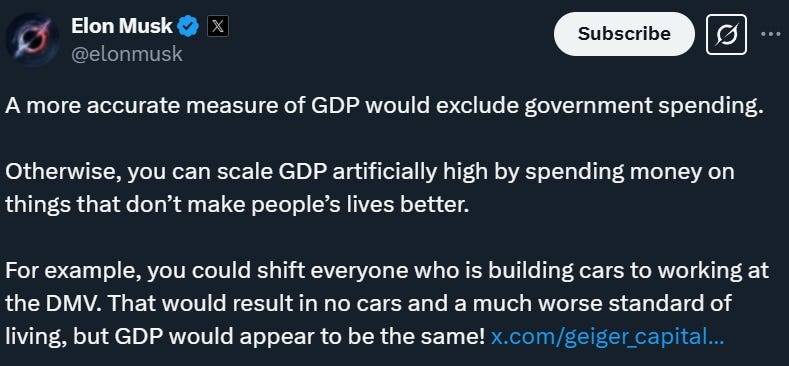















Noah - what are we doing here? What DOGE is doing when they "stop payments" to groups that Elon Musk personally dislikes, this isn't "a good idea" - it's *a crime*. DOGE is committing crimes. The crime is called impoundment, and it's in violation of Article I of the US Constitution. The executive branch has no authority to choose which parts of federal statues they want to follow. You can find plenty of scholarly articles by legal experts who can explain this.
If you want "singaporean style efficiency", great! Pass laws, amend the US Constitution most likely if you truly want the executive branch to have unilateral spending authority, and do it legally. I can't believe you're arguing for a lawless approach and in support of actual criminals.
‘DOGE is a political purge’ is spot on. Honestly I can sort-of see why it’s appealing; many political and cultural institutions are dominated by deeply ineffective Donkey Tribe people. I’m a European and our regulatory apparatus could also use some rough handling to align itself with our actual interests.
But I find the conspiratoritorial anti-‘deep state’ type thinking that’s seized the right to be even worse than the damage it does to state capacity. They really think Zelensky is a plant by the CIA deep state, who also somehow faked the Maidan revolution and probably several past elections. Literally going to Fort Knox to see if the gold’s still there, as if NGO libs’ main problem isn’t thr overbearing sincerity of their beliefs and an unwillingness to get their hands dirty. I know a lot of that discourse is just crazy people on Twitter but they’re close enough to Elon that it’s very worrisome, and I’m afraid it has already started to seep into foreign policy. It’s beyond owning the libs, veering into actual insanity.